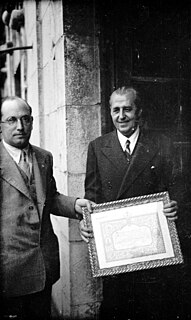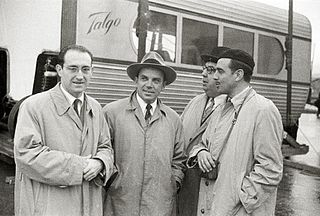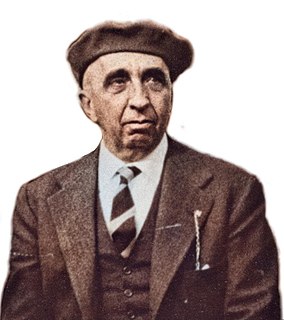 W
WLuis Arellano Dihinx (1906–1969) was a Spanish Carlist and Francoist politician. He is recognized as one of the leaders of the so-called Juanistas, a faction within Carlism pressing recognition of the Alfonsist claimant Don Juan de Borbón as a legitimate Carlist heir to the throne.
 W
WAgustín Aznar Gerner was a Spanish medical doctor, political activist with the Falange and a leading figure during the Spanish Civil War. Aznar was part of a radical element within the followers of Francisco Franco and at times represented a challenge to his leadership.
 W
WJoaquín Bau Nolla (1897–1973) was a Spanish Carlist and Francoist politician.
 W
WEsteban de Bilbao Eguía was a Spanish Carlist and Francoist politician.
 W
WLeopoldo Ramón Pedro Calvo-Sotelo y Bustelo, 1st Marquess of Ría de Ribadeo, usually known as Leopoldo Calvo-Sotelo, was Prime Minister of Spain between 1981 and 1982.
 W
WLuis Carrero Blanco was a Spanish Navy officer and politician, who served as Prime Minister from June 1973 until his assassination in December of that year. He participated in the Rif War, and later the Spanish Civil War, in which he supported the Nationalist faction.
 W
WPedro Cortina Mauri was a Spanish politician and diplomat who served as the last Minister of Foreign Affairs under Francisco Franco between 1970 and 1975 and the first one with democracy until 1980. He had been Ambassador to France. He is the father of the famous businessmen Alfonso and Alberto Cortina. His wife died in 1976.
 W
WTomás Domínguez Arévalo, 6th Count of Rodezno, 12th Marquis of San Martin (1882–1952) was a Spanish Carlist and Francoist politician. He is known mostly as the first Francoist Minister of Justice (1938–1939). He is also recognised for his key role in negotiating Carlist access to the coup of July 1936 and in emergence of carlo-francoism, the branch of Carlism which actively engaged in the Francoist regime.
 W
WJesús Elías Francisco Elizalde Sainz de Robles (1907-1980) was a Spanish Carlist politician. He served in the Cortes in two separate strings: during the Second Republic in 1936 and during Francoism in 1954-1958. In 1938-1939 he was a member of Junta Política of Falange Española Tradicionalista, and in 1954-1958 he was a member of FET's Consejo Nacional. In 1942-1944 he headed the regional Carlist Navarrese organization. Politically he sided with the Carlist branch which opted for conciliatory policy towards the Franco regime and leaned towards a monarchist dynastical alliance.
 W
WÁlvaro de Figueroa y Torres-Sotomayor, 1st Count of Romanones was a Spanish politician and businessman. He served as Prime Minister three times between 1912 and 1918, president of the Senate, president of the Congress of Deputies, Mayor of Madrid and many times as cabinet minister. He belonged to the Liberal Party. Romanones, who built an extensive political network, exerted a tight control on the political life of the province of Guadalajara during much of the Restoration period. He also was a prolific writer, authoring a number of history essays.
 W
WManuel Fraga Iribarne was a Spanish professor and politician in Francoist Spain, who was also the founder of the People's Party. Fraga was Minister of Information and Tourism between 1962 and 1969, Ambassador to the United Kingdom between 1973 and 1975, Minister of the Interior in 1975, Second Deputy Prime Minister between 1975 and 1976, President of the People's Alliance/People's Party between 1979 and 1990 and President of the Regional Government of Galicia between 1990 and 2005. He was also a Member of the Congress of Deputies and a Senator.
 W
WLicinio de la Fuente y de la Fuente was a Spanish Francoist politician who served as Minister of Labour from 1969 to 1975. Promoter of the Democracia Social party during the Spanish Transition, he was one of the "Magnificent Seven", the seven political leaders who founded the federation of People's Alliance (AP) in 1976.
 W
WAntonio Goicoechea was an Alfonsine monarchist politician and lawyer in Spain during the period of the Second Spanish Republic and the Spanish Civil War. He started to become politically relevant when he became the leader of the Juventudes Mauristas, and he would later serve as Minister of the Interior from 15 April 1919 to 20 July 1919 in a Maura cabinet. He led the authoritarian Renovación Española political party. Prior to the Civil War, Goicoechea in 1934 had negotiated alongside with the Carlists Antonio Lizarza Iribarren and Rafael de Olazábal y Eulate with the Italian dictator Benito Mussolini on a military agreement to guarantee Italian support of their movements if a civil war erupted in Spain. However, according to Lizarza, when the Civil War erupted in 1936, it had not been initiated by Goicoechea or other members of the agreement but by a group of army officers and so Goicoechea's agreement with Mussolini did not go forward. After Falange Española Tradicionalista y de las Juntas de Ofensiva Nacional Sindicalista emerged in 1937, Goicoechea dissolved Renovación Española and served as the 58th Governor of the Bank of Spain and Procurador en Cortes.
 W
WAmadeo Marco Ilincheta (1900-1987) was a Spanish Traditionalist politician, until 1942 active within the Carlist movement and afterwards in the Francoist structures. He is best known as the iconic Navarrese personality of the Franco era, principally as a longtime member of the regional self-government, Diputación Foral. He served as representative of the Aoiz-Sangüesa district in 1931 and then continuously during 6 successive terms in 1940–1979; during a few strings he was acting president of the Diputation. In 1943-1954 and in 1967-1977 he held a seat in the Francoist Cortes. In 1942-1954 he was member of the Falange Española Tradicionalista executive, Consejo Nacional. Since 1927 he intermittently served as the mayor of Navascués.
 W
WVictoriano José Martínez Berasáin (1886–1960) was a Spanish Carlist politician, noted particularly in his native Navarre. He is best known for his role during anti-Republican conspiracy of early 1936 and during first months of the Civil War, when he headed the regional wartime Carlist executive. In 1937–1938 he was the provincial leader of Falange Española Tradicionalista; in 1939 he served as vice-president of Diputación Foral de Navarra. During two successive terms of 1955–1960 he was holding a seat in the Cortes. He is also acknowledged as an amateur photographer.
 W
WPedro Muguruza Otaño (1893–1952) was a Spanish architect and Falangist politician.
 W
WArmando Muñoz Calero (1908–1978) was a Spanish physician and falangist politician. He was a member of the Cortes Españolas during the Francoist dictatorship, while he also served as president of the provincial government in Madrid and as deputy-mayor of the Madrid City Council.
 W
WAntonio María de Oriol y Urquijo (1913–1996) was a Spanish politician and businessman. Politically he supported the Traditionalist cause, first as a Carlist militant and then as a Francoist official. In 1955–1977 he was a member of Cortes Españolas; in 1957–1965 he headed the welfare department in the Ministry of Interior; in 1965–1973 he served as the Minister of Justice; in 1973–1978 he was a member of the Council of the Realm and in 1973–1979 he presided over the Council of State. As businessman he was active in companies controlled by the Oriol family, holding executive positions in Iberdrola, Patentes Talgo and other entities.
 W
WJosé María de Oriol y Urquijo, 3rd Marquis of Casa Oriol (1905–1985) was a Spanish entrepreneur and a Carlist and Francoist politician. During early Francoism a mayor of Bilbao, he is known mostly for his business activity, especially for his role in the Spanish energy industry, TALGO train development and the banking sector. He is counted among the most influential Spanish business managers of the 20th century.
 W
WJosé María Pemán y Pemartín was a Spanish journalist, poet, playwright, novelist, essayist, and monarchist intellectual.
 W
WMariano Puigdollers Oliver (1896-1984) was a Spanish academic, politician and civil servant. Between 1920 and 1966 he held various jurisprudence chairs in numerous Spanish universities, mostly in Valencia (1924-1936) and in Madrid (1940-1966); he is known among key representatives of Spanish Natural law of the 1940s and 1950s. Initially a conservative monarchist, in the mid-1930s he joined Carlism and briefly served as its regional Valencian jefe. Since the late 1930s he identified himself with the Franco regime. During early and mid-Francoism he was employed at key posts at Dirección General de Asuntos Ecclesiásticos department within the Ministry of Justice, at Consejo Superior de Protección de Menores and at Consejo Superior de Investigaciones Científicas. Between 1943 and 1965 he served in the Francoist Cortes. He is considered one of key officials implementing post-civil-war purges among the academics.
 W
WJesús Requejo San Román (1880-1936) was a Spanish Catholic militant, theorist of society and politician; the Catholic Church declared him a martyr and a candidate for sainthood. He was locally known in the provinces of Zamora and Toledo for his activity in education, charity and agrarian syndicalism. His key work, Principios de Orientación Social, made some moderate impact among Spanish Catholic intellectuals of the mid-1930s. Politically he evolved from centre-left to extreme right: initially Requejo supported the Romanonista dynastic Liberalism, then he turned towards accidentalist Acción Católica, and finally he joined Carlism. His career climaxed in the mid-1930s; since 1934 he headed the provincial Carlist structures in Toledo and in 1936 he served as a Carlist deputy to the Cortes.
 W
WJosé María Sentís Simeón (1896–1989) was a Spanish politician, official and military. He is best known as General Director of Prisons for 8 months in 1942–43 and as civil governor of Guadalajara and Palencia, also during the early Francoism. In 1964–67 he served as the Cortes deputy. Throughout most of his life he was an active Carlist, in 1962–65 serving as Secretario General of Comunión Tradicionalista. He retired from the army in the rank of a colonel.
 W
WJosé María Valiente Soriano (1900-1982) was a Spanish politician. He commenced his career in Acción Nacional and gained recognition as leader of Juventudes de Acción Popular, the youth branch of CEDA. In 1935 he joined Carlism; his political climax fell on the period of 1955-1967, when he was leading the mainstream Traditionalist organisation. After 1971 he unsuccessfully engaged in buildup of conservative monarchist groupings. He served in the Republican parliament during two terms between 1933 and 1936; between 1967 and 1977 during two terms he held a mandate in the Francoist Cortes. In 1937-1942 he was member of Consejo Nacional of Falange Española Tradicionalista.